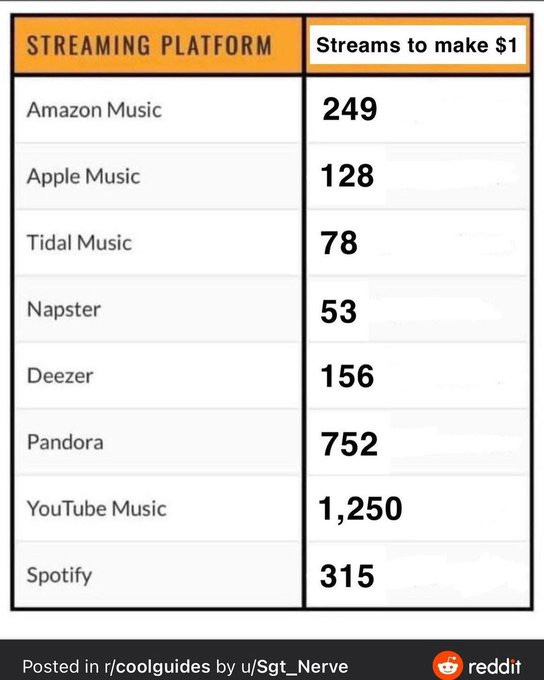
This is a collection of some of the coolest, most interesting, and weirdest concepts I discovered in 2021. I spent a loooooong time crafting this, I hope you enjoy it.
If you enjoy this type of work, please consider subscribing for free to A Pryor Thought. Thanks!
***NOTE: Almost all of the headlines are clickable articles taking you to more information on the idea.***
The Capitalist Capitulation of Art
Freakonomics did an amazing 3-part episode diving into the obscure world of the global art market.
The part that stood out the most to me: “the top 20 artists now make up nearly 50 percent of the auction market for post-war and contemporary art. If you look at galleries and dealers, fewer than 5 percent of them are responsible for more than 50 percent of the sales value.”
Et tu, art world?
Be Happy, You’re Smiling
According to a study published in Experimental Psychology, researchers found the act of smiling — even a fake smile — can have a positive impact on mood. Essentially, triggering certain facial muscles by smiling might “trick” your brain into thinking you’re happy.
“When your muscles say you’re happy, you’re more likely to see the world around you in a positive way” — Fernando Marmolejo-Ramos, study author
😄
Magic Mushroom Evolution
The Stoned Ape hypothesis “suggests we owe the emergence of language and self-reflection to ancient, sustained consumption of psilocybin mushrooms.” The idea would solve a big gap in our history — the giant evolutionary step to self-consciousness. The scientists stress the theory is almost certainly impossible to prove or disprove, however. But it sure is interesting.
The Dense-ist House in the World
This large McMansion-sized building has 18,000 residents. But only a few people reside there.

It’s called the Ugland House and is home to 18,000 offshore businesses in the Cayman Islands. If you want a lesson in dancing on a moral tightrope in PR, have a read through their FAQ.
If you want to evade billions in taxes forcing the burdens of society onto the poor, read the rest.
How Many Streams to Make $1
A user named Sgt_Nerve posted this on Reddit, it blew up there, then T-Pain tweeted it and the “debates” began.
It’s hard to verify the accuracy of these numbers, but they’re likely in the ballpark. Of course, different countries, music lengths, repeated streams, etc, all combine to give the real numbers a range rather than an absolute value — but it shows how much sheer volume is required to make a decent living in the creator economy these days.
Making Headway in U.S. Voting Rights
St. Louis adopted a nonpartisan “approval voting” system where they can vote for as many candidates as they want, instead of only one. The first step in a great direction sorely needed in political systems.
Quantity vs Quality in Write Good Word Things
The founding editor of The Onion, Scott Dikkers, on the humor writing process:
“Basically, 95% of everything we create is garbage.”
“We quickly realized that the quality of our ideas increased with the number of ideas people brought in. When you have six high-performing comedy writers coming up with 20 ideas each, you’re gonna walk away with a dozen headlines that are just solid, I mean really funny.”
“This is how professionals work because they understand that most of what they write is dreck.”
I like people who use the word “dreck.”
Intelligence, Creativity, and Offspring
Judith Love Cohen helped create the Abort Guidance System, the computer that played a major part in saving Apollo 13 astronauts. She was a famous satellite engineer, pro ballet dancer, publicist, and prolific author.
She’s also the mother of Jack Black. Amazing.
Healthy Gut, Healthy Mind
The gut microbiome is continuing to fascinate me this year. One point in particular — “gut bacteria manufacture about 95 percent of the body’s supply of serotonin.”
That’s the “feel good” neurotransmitter. Between this and all of its other wondrous functions, it’s no wonder some doctors are calling it the body’s “second brain.”
Surprising Engineering
“Microphones and earphones depend on vibrating diaphragms to convert sound into electrical signals and back to sound again, so you can speak into your earphones to record audio. The audio quality of re-purposed earphones is inferior compared to purpose-built microphones, but they can be improved slightly using audio settings in the computer.”
It took me a while to believe/understand this one. Neat.
We’re Becoming…Smarter?
The Flynn Effect describes the long-term trend of increasing IQ scores in many areas of the world.
Are we actually becoming smarter or is the IQ test itself in need of improvement? Also note, the chart stops after the 2016 election and the pandemic…
Old School Acquisitions
“TIL Genghis Khan would marry off a daughter to the king of an allied nation. Then he would assign his new son in law to military duty in the Mongol wars, while his daughter took over the rule. Most sons in law died in combat, giving his daughters complete control of these nations”
Fishy Mysteries
Ever wonder why barren lakes magically have fish appear all of a sudden? It might be the ducks. Apparently, fish eggs can survive being eaten and still hatch.
Think about that the next time you eat this:

The Sad Mad Truth of Recycling Plastic
Less than 10% of all plastic has ever been recycled. And even then, it can only be reused once or twice.
$50 million annual pro-recycling marketing budgets, federal and state lobbying, and misusing well-intentioned ♻️ symbols ♻️ is likely why most of us still see a plastic yogurt cup and go “at least it’s recyclable.”
But in most cases — it’s not.
All to protect an oil industry that makes $400 billion a year from keeping us supplied with a cheaper product — newly minted plastic.
“NPR and PBS Frontline spent months digging into internal industry documents and interviewing top former officials. We found that the industry sold the public on an idea it knew wouldn’t work — that the majority of plastic could be, and would be, recycled — all while making billions of dollars selling the world new plastic.”
This is a massive problem:
“5.25 trillion macro and micro pieces of plastic in our ocean & 46,000 pieces in every square mile of ocean, weighing up to 269,000 tonnes.
It’s yet another reason why an economic system devoid of negative externalities is slowly killing us, even the industries perpetuating the problems.
Play to Earn (and Make Other People Money)
Axie Infinity is the world’s biggest “play-to-earn” video game to the tune of billions of dollars. It aims to combine the fun of video games with the ability to earn a living. It’s also more or less based on cryptocurrency.
But it seemingly has at least two major problems:
Many users describe it as not being fun at all and feeling exactly like working a monotonous day job
Its business model is seemingly dependent on new players joining (which requires buying 3 x ~$100 crypto coins to join)
But hey, at least people aren’t definitively calling it a Ponzi scheme yet.


Science and Diabetes
“Lead investigators Greg Korbutt and Andrew Pepper are developing an implant to be placed under the skin which they hope could work as a functional cure to the disease. This includes both cells to help regulate insulin and anti-rejection drugs to ensure their body accepts the treatment.”
Hopefully, a cure is in sight for this deadly disease.
Fake News Isn’t New
An infamous newspaper battle between Joseph Pulitzer and William Randolph Hearst — often referred to as “yellow journalism”—occurred a century ago and only pseudo-stopped after the calling for and subsequent assassination of a U.S. president. Yikes.
Acting Out in Business
Ryan Reynolds has now invested (publically at least) in three very different startups. And none of them are related to his main profession. American Gin, a wealth management competitor to Robinhood, and — a mobile virtual network operator (telco).
It must be a lucrative proposition to have mega-actors invest in your company, at least on a marketing front.
Hacking Our Psyche for Evil Gains
Hackers are using the inherent bugs in our system (cognitive biases) to greater effect.
SecurityAdvisor found that C-suite executives are targeted 50 times more than regular employees, followed by people on IT security teams, who are targeted 43.5 times more than regular employees…Cybercriminals targeting C-suite executives tend to employ the halo effect or the curiosity bias, while the majority of scams against IT security teams employed the curiosity bias.
Creatine Cycling Myth
Creatine has been one of the most studied sports supplements in history.
The International Society of Sports Nutrition published a position paper based on hundreds of previous studies that suggest creatine isn’t just for bodybuilders anymore — nor does it have to be cycled as is frequently taught in gym bro-code:
These studies provide a large body of evidence that creatine can not only improve exercise performance, but can play a role in preventing and/or reducing the severity of injury, enhancing rehabilitation from injuries, and helping athletes tolerate heavy training loads. Additionally, researchers have identified a number of potentially beneficial clinical uses of creatine supplementation. These studies show that short and long-term supplementation (up to 30 g/day for 5 years) is safe and well-tolerated in healthy individuals and in a number of patient populations ranging from infants to the elderly.
Inflated Values
Inflation rates are hitting pretty scary levels.
“Annual inflation rate in the US accelerated to 6.8% in November of 2021, the highest since June of 1982, and in line with forecasts. It marks the 9th consecutive month the inflation stays above the Fed’s 2% target as global commodities rally, rising demand, wage pressures, supply chain disruptions and a low base effect from last year continue to push prices up.”
At 10 years:
At 25 years:
At 100 years:
Are we reverting back to inflationary instability? Probably not, but as the old adage says, what goes up…
The Terminator Cometh
A robot drone likely killed someone autonomously for the first time in history this year. I think there’s about to be a lot more serial killers in the near future if extrapolated.
Forever 21
“Researchers found that metabolism peaks around age 1, when babies burn calories 50 percent faster than adults, and then gradually declines roughly 3 percent a year until around age 20. From there, metabolism plateaus until about age 60, when it starts to slowly decline again, by less than 1 percent annually.”
I guess that’s one less excuse after the January Effect wears off in the gym.
Our Dollars Aren’t Being Spent
If you have a basic level of finance knowledge under your belt, this is a great assessment of why the velocity of money dropped so drastically during the pandemic, and why this inflation surge is likely transitory, after all.
“Upon review, the increases in money supply are not generating or “chasing” goods and services but rather staying trapped in financial markets/accounts, which have pushed asset valuations to record levels.”
Happiness or Satisfaction?
Cognitive psychologist and Nobel Prize laureate Daniel Kahneman on money, happiness, and satisfaction:
“For instance, with regard to money, life satisfaction rises in direct proportion to how much you have. In contrast, happiness is affected by money only when it’s lacking. Poverty can buy a lot of suffering, but above the level of income that satisfies basic needs, happiness, as I define it, doesn’t increase with wealth. The graph is surprisingly flat.”
The old adage is apparently true. Money can’t buy happiness.
Programmatically Biased
Algorithms are often based on massive data sets, and those data sets often contain massive biases. Thus, advanced computer algorithms can further perpetuate human biases at scale. Yikes.
A few examples of proven cases:
“The COMPAS (Correctional Offender Management Profiling for Alternative Sanctions) algorithm, which is used by judges to predict whether defendants should be detained or released on bail pending trial, was found to be biased against African-Americans.”
“Online retailer Amazon, whose global workforce is 60 percent male and where men hold 74 percent of the company’s managerial positions, recently discontinued use of a recruiting algorithm after discovering gender bias.”
“…a web site, which marketed the centennial celebration of an all-black fraternity, received continuous ad suggestions for purchasing “arrest records” or accepting high-interest credit card offerings.”
Long-term Business Thinking
59 companies in the world are over 700 years old. 40% of them are in Japan. The rest are spread throughout Europe. Many of the businesses are hotels, pubs, and my favorite — breweries.
The Most Successful Company in History
I always thought the huge lawsuits and governmental crackdown on Big Tobacco in the late ’90s would’ve shown industries they shouldn’t kill people for money. ‘Twas nothing but a blip.
“One dollar invested in tobacco stocks in 1900 was worth $6.3 million by 2010. That’s 165 times greater than the average industry.”
Sigh.
Swearing in Humor Writing
The internet can be a picky place. Swear too much and you turn off 90% of readers. Swear even once and get rejected by most publications. Or you can go the other direction and compose a short humor essay about vaccines while using the word “fuck” 112 times and go massively viral. Fucking hilarious.
How Do I Lift, Bro?
I love finding beautifully simplistic small website projects. Here’s one of my favorites this year for weightlifting.
Click on a muscle, see the exercises. Simple and beautiful.
How to Instantly Write a Bestseller
If you want to hit the #1 spot on Amazon with a new book, you need to sell around 3,000 to 5,000 copies in 24 hours. For the top 10 spots, that drops to around 500 to 2,000.
It’s why a lot of authors rely on booklists and pre-sales and huge ad budgets. It’s also why several politicians of a certain political party in the U.S. have bestsellers with very few “genuine” sales.
“The National Republican Congressional Committee, which works to elect GOP candidates to Congress, spent nearly $400,000 on bulk purchases of the book. The organization acquired 25,500 copies through two online booksellers, enough to fuel “Fortitude’s” ascent up the bestseller lists. The NRCC said it gave away copies as incentives to donors, raising $1.5 million in the process.”
It’s probably also why the best-selling “political satire” books on Amazon consist of several…not so humorous books by Fox News pundits. Of course, I might just be jealous — I have my own satirical competitor in there, too:

Sadly, Super PACs aren’t lining up to buy it—yet.
Alphaless Male Wolves
The concept of alpha males in wolfpacks is a myth. It was first popularized in the book The Wolf: Ecology and Behavior of an Endangered Species.
The main problem? All of the observations were of wolves in close captivity, the effect was never observed in the wild. The author, David Mech, stated he has since repeatedly asked the publisher to stop selling the book because of the outdated information. But it’s still up for sale 40 years later.
Policing for Profit
Civil asset forfeiture is a massive abusive loophole across the U.S. It’s the process of police seizing assets from citizens without having to charge them of a crime.
“Since 2000, states and the federal government have forfeited at least $68.8 billion — that we know of. Not all states provided full data, so this figure drastically undercounts property taken from people through forfeiture.”
Where does the money go? Back to the police that took it.
“‘Policing for Profit’ finds forfeiture proceeds mostly support law enforcement budgets, not crime victims or community programs. In 2018, agencies in 13 states with expenditure data spent almost no proceeds on victims and just 9% on community programs on average.”
And in case you think it only affects large criminal enterprises, well:
“Data from 21 states show half of all currency forfeitures are worth less than $1,300.”
Maine and New Mexico have started reforming this gaping loophole. Hopefully many more states to come.
The Bubble of All Bubbles?
“Marketers are often most successful at marketing their own marketing.”
A few lucky world-leading economists have done experiments on the effectiveness of digital ads over the years. They usually can’t, because companies and their marketing departments are often hesitant to share vast swaths of such useful information.
But occasionally it does happen — and the picture paints a massive biased bubble of ignorance with one conclusion:
Digital ads are vastly ineffectual and companies are wasting tens of billions a year on it.
Why? Because of data biases and organizational structure.
Most marketing data collected focuses on the outcome and ignores the selection of data: “Selection effects substantially outweighed advertising effects in most of these Facebook experiments. At its strongest, the selection bias was even 50 (!) times more influential.”
Most marketing departments are incentivized to garner larger budgets. Proving massive spending on advertising is “effective” thus becomes imperative, regardless of reality.
But ask yourself, if up to 90% of ad-spend is a complete waste of money, what companies would suffer from a bubble popping?
“In 2018, more than $273bn dollars was spent on digital ads globally, according to research firm eMarketer. Most of those ads were purchased from two companies: Google ($116bn in 2018) and Facebook ($54.5bn in 2018).”
Then again, if everyone seemingly benefits from the veneer of effectiveness, why would it ever stop? Very intriguing deep dive.
From Paper to Screen
Another amazing (and super-viral) small project by Ben Stokes. The inventor had the simple idea of seeing if he could use a phone and a physical notebook to generate a decent-looking blog. He succeeded.
He also wrote an amazing and enjoyable behind-the-scenes story of why and how he created it.
Write your words, take a picture with the app, upload to your blog. Fantastic.
When Will You Quit Your New Years Resolution?
January 19th, according to 100 million data points from the popular biking app Strava. They cheekily call it “Quitter’s Day” now. I’d call it Break a Wish Daycation, or something funnier.
Write What You Know
Skilled writers often have one piece of advice: “Focus on the reader, never talk only about yourself.”
A solid piece of advice. But as with any rule, it should be completely ignored from time to time. In this case of ignorance, I wrote a massively viral true story that earned me $1,300. I guess serial killers are a popular subject, after all.
We Want It That Way
“About 87 percent of Covid coverage in national U.S. media last year was negative. The share was 51 percent in international media, 53 percent in U.S. regional media and 64 percent in scientific journals.”
When vaccines were developed, they wouldn’t hit the front page. When infection rates dropped, they weren’t discussed. A new study shows high immunization rates? Back page, please.
Bad news is simply good news, especially on Facebook and other interactive sites.
The theory? People — and especially Americans — prefer negativity and the media platforms are just maximizing for attention and thus profit. A simplistic view of an important societal problem and it likely overlooks the motivations of media conglomerate owners.
But a contributing theory nonetheless.
Learned Helplessness
From one of my favorite podcasts this year, You Are Not So Smart by David McRaney:
“The Misconception: If you are in a bad situation, you will do whatever you can do to escape it.
The Truth: If you feel like you aren’t in control of your destiny, you will give up and accept whatever situation you are in.”
Learned helplessness is a concept I’ve been slowly exploring more and more as I notice the effect in varying degrees throughout my life and environment.
The good news? It’s also reversable.
“This passivity can be overcome by learning control, with the activity of the medial prefrontal cortex”
I’m J.J. Pryor and I support this message.
👇I’d love it (and you?) if you helped share this!👇














Happy New Year to you too, JJ - hope it’s a good one!
I loved this one. Amazing information and great way to present it. Thank you.